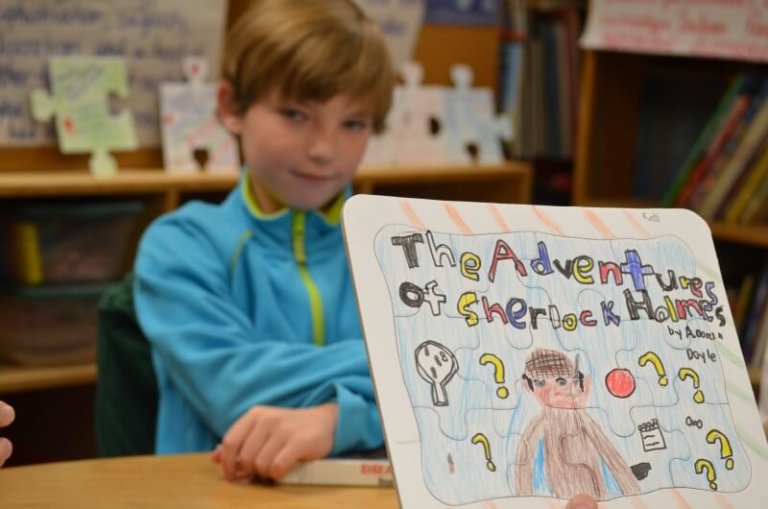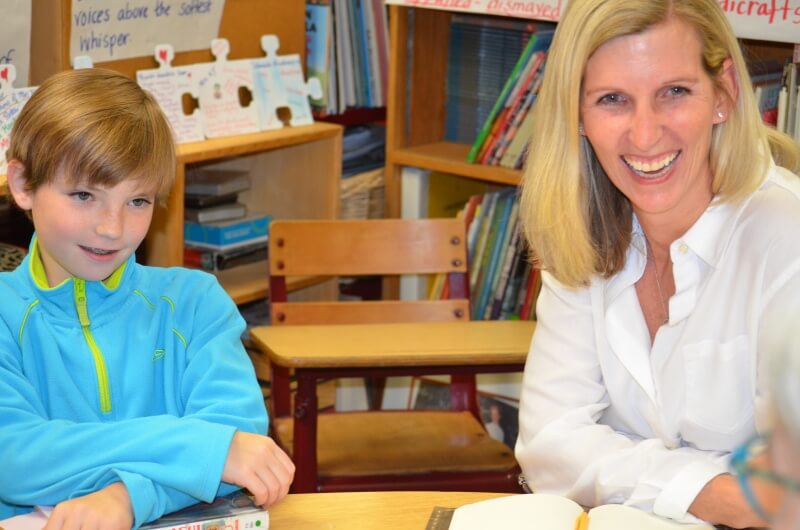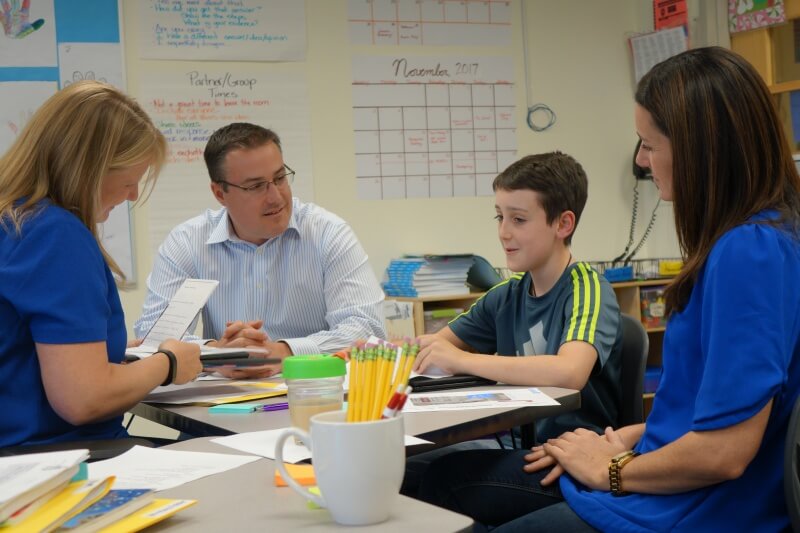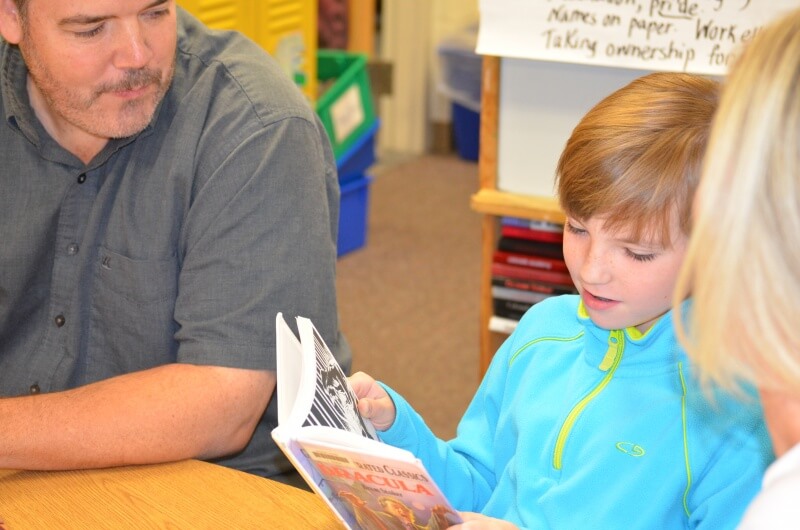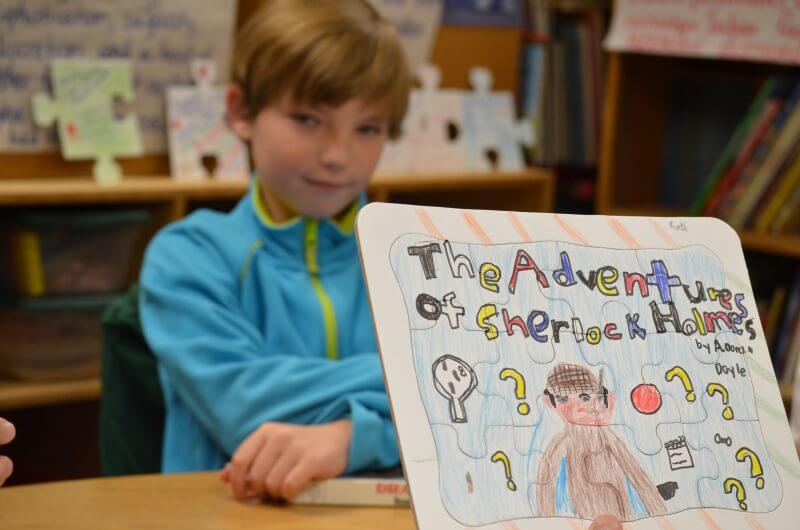Last year, when she was in third grade, Kate Freeman heard about her Parent-Teacher Conference from her mother and father. This year, there was no mystery about the conversation that parents and teachers have at a conference, because starting in fourth grade, CA students participate in the conference.
Afterwards, Kate talked about the experience with earnest maturity beyond her nine years.
“Surprisingly, I wasn’t nervous,” she says. “But I was surprised by my math score. It was higher than I thought it would be!”
Kate Freeman, Grade 4
Kate didn’t go into her first conference cold. Fourth grade teacher Suzanne Kolsun Jackson had spent days helping her students prepare an agenda for their meetings. Working together, teacher and students created portfolios of work—samples of reading, writing, and math—to present to parents. Kolsun Jackson also prepared the students for the possibility that the conference might cause stage fright. “I tell them, ‘This is not meant to induce stress,’” she says. “’It’s really a celebration of your learning.’”
With all the advance work, students sail through their conferences. They read a paragraph aloud from a favorite book. (Kate chose Dracula.) They present their creative writing, show off their keyboarding and other technology skills, and discuss the answers to their worksheet “Fourth Grade Fall Conference Reflection,” assessing their own organizational skills, work habits, study behaviors, class behavior, and feelings about the school year so far.
“They know everything!” Kolsun Jackson exclaims. “With students present, the conferences run themselves. They have the opportunity to demonstrate pride in what they are doing and articulate goals for the future. Parents love it.”
Kate’s mother, Nora Freeman, also has two students in CA’s Upper School, Anne in tenth grade and Ben in eleventh grade, so she is a veteran of student-centered conferences. She sees an evolution in the conferences, as her children have moved through CA.
“For Kate in the fourth grade, the conference solidifies a partnership between all three entities in a way the child can see,” she says. “Parents, teachers and the student are all working toward the same goal. With Upper School children, the conference gives parents an opportunity to see the partnership between students and teachers. For all students, it allows them to take responsibility for their own education.”
Kyle Manzo, Grade 5
Kevin Manzo admits that the first time he went to a Parent-Teacher conference with his son, present it was “different.” But he quickly decided it was a good opportunity for Kyle to learn poise and presentation and to see how his “home world” and “school world” are connected.
“The conference showcases to Kyle how teachers and parents are aligned,” Manzo says.
Kyle’s teacher, Jessica Ohly, remembers teaching at a school where students did not attend conferences. “Without the student there, it feels more like a ‘performance,’ as if you are trying to convince the parents of what you think is true about the child,” she says. “By fifth grade, students know what you are going to talk about, and they bring up important topics themselves. The student speaks, you validate the child’s strengths, and you talk about the areas where the child can grow. It is not a performance.”
Ohly says she “loves” having students present at conferences, but points out that sometimes both parents and students can become emotional. “Students can be overcome by being the center of attention,” she says. “But they recover and realize they are resilient. For parents, sometimes they are so proud they cry, because they are so impressed when they realize how independent their children can be.”
Manzo likes the fact that CA also provides the opportunity for private conferencing without the student present, to discuss concerns at home and in the classroom. “We’ve been very fortunate at CA,” he says. “The teachers are very accessible.”
Freeman concurs, pointing out that the conference is just one chance to check in. Teachers welcome emailed inquiries, phone calls, and ongoing talks with parents. “It’s all part of the CA communication continuum,” she says.
‘None of us will bail or fail’
Kolsun Jackson offers the last 10 minutes of a Parent-Teacher conference for private discussion with parents, but she finds that often the students never leave because everyone is enjoying the experience. “You remain firm, fair and focused,” she says. “But students know we love them and understand that we are all in this together. None of us will bail or fail.”
As a longtime parent at CA, Freeman believes the Parent-Teacher conference with students is just another example of CA’s commitment to a student-centered education. She acknowledges that it might take more preparation and time for teachers to include students but believes it’s well worth it.
“CA values doing what is in the best interest of children,” she says. “They don’t take the easiest way; rather they take the path that best forms our children into the adults we strive for them to be.”
